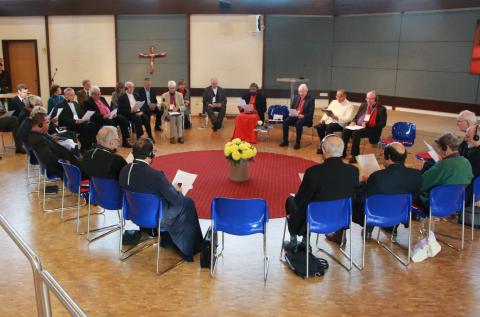
Photo credit: Ursel Haaf
, the 35th international meeting was held by 25 bishops of various churches that draw inspiration from the spirituality of the Focolare Movement. The reflections on the points of spirituality of the
charism of unity, praying together, and celebration of the various liturgies, set the basis for deep encounters and dialogues that left an indelible mark in the participants. The theme of the meeting, “
Jesus Forsaken foundation of a spirituality of communion
“ guided the entire convention which the bishops wished to conclude together with the Carmel community located next to the Concentration camp of Dachau, for a confrontation with one of the most painful phases of humanity’s story. A new perspective opened and gave hope to all:
“For me, the trip to Dachau was like visiting a shrine to Jesus Forsaken. I met God there, in His abandonment”, said
Jesús Morán, Co-President of the Focolare Movement. And the
Maronite Bishop Simon Atallah of Lebanon added: “Next to a place of suffering and hatred, we found a place of love.”
One of the peak moments of the meeting was the ecumenical liturgy in the evangelical church of St.Anne in Augsburg. Also present was Bishop Emeritus Christian Krause, one of the main signers of the “Joint Declaration on the doctrine of justification”, on 31 October 1999 in the same place. The group of bishops took this occasion to formulate
a message for the opening of the celebrations for the 500th anniversary of the Reform, which was held in the Swedish city of Lund. They also sent a delegation.
The mayor of the city of the “Pax Augustus,” Kurt Gribl, upon welcoming the bishops underlined how «The Focolare Movement, and in particular, the group of bishops, represent confessions that do not deny the differences.» And seeing a tight bond between the city of Augsburg and the commitment of the ecumenical community of bishops, added:
«You and your example demonstrate that it is possible to coexist peacefully and spiritually, and this encourages us to move onwards in collaborating as a city of peace.»
To seal this deep friendship and spiritual bond, the group then gathered in the evangelical church of St. Ulrich. It is by now a tradition during these ecumenical meetings, for the participating bishops to formulate a solemn promise, to support one another in prayer and life, sharing worries and sufferings, and joys and conquests of their brothers. «The cross of one becomes the cross of the other, and the desire of one becomes the desire of the other», states the “Pact of mutual love,” which all signed.
The next bishops’ meeting promoted by the Focolare Movement will take place in 2017 in Poland.
0 Comments